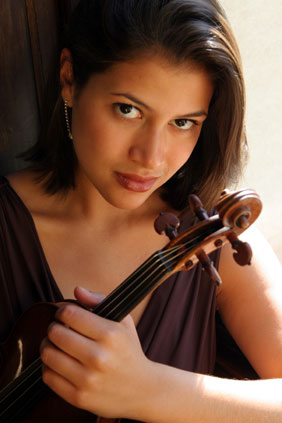By Stephen Brookes • The Washington Post • October 11, 2012
The gifted young musicians known as the Sphinx Virtuosi are an intriguing group: They’re all laureates of the Sphinx Competition for young black and Latino string players, which is dedicated to developing diversity in classical music. They arrived at the Terrace Theater on Wednesday night as part of the Fortas Chamber Music series and presented a program of largely Latin American music that was beautifully played — and, frankly, a refreshing counterpoint to the pallid menu of Bruckner, Beethoven and other low-risk composers being wholesaled at the Kennedy Center this season.
In fact, some of the most fiery and flavorful music of the past century has come out of Latin America, and the Sphinx players (joined by the Catalyst Quartet) made a good case for bringing more of it into the mainstream. It might have been a mistake to open with Heitor Villa-Lobos’s drippy, Europe-aping “Suite for Strings,” but the ensemble dispatched it with reasonable haste and taste and quickly moved on to meatier fare.
Cellist Gabriel Cabezas got the adrenaline flowing with a furious, loose-limbed performance of “Moto Perpetuo,” from “Lamentations for Solo Cello” by African American composer Coleridge-Taylor Perkinson, and the Catalyst Quartet took the stage for Osvaldo Golijov’s “Tenebrae.” It’s a meditative work whose floating mists and cosmic ambiguities can, in the wrong hands, seem like music to do yoga by, but the Catalyst players turned in a serious, convincing account. Elena UriosteThe tone shifted from dark to light when the quartet launched into “Strum,” a hugely enjoyable new work by Sphinx violinist Jessie Montgomery. Turbulent, wildly colorful and exploding with life, “Strum” sounded like a handful of American folk melodies tossed into a strong wind, cascading and tumbling joyfully around one another. Montgomery also wrote the evening’s encore, “Star-burst”; at 30, she’s an inventive and appealing composer with interesting things ahead of her.
Elena UriosteThe tone shifted from dark to light when the quartet launched into “Strum,” a hugely enjoyable new work by Sphinx violinist Jessie Montgomery. Turbulent, wildly colorful and exploding with life, “Strum” sounded like a handful of American folk melodies tossed into a strong wind, cascading and tumbling joyfully around one another. Montgomery also wrote the evening’s encore, “Star-burst”; at 30, she’s an inventive and appealing composer with interesting things ahead of her.
An electrifying performance of Alberto Ginastera’s “Finale Furioso” from his Concerto for Strings closed the concert, but it was the “Four Seasons of Buenos Aires” by the Argentine composer Astor Piazzolla that really stole the show. Or rather, it was violin soloist Elena Urioste who stole it. A drop-dead beauty who plays with equal parts passion, sensuality, brains and humor, Urioste tossed off the work’s captivating tangos and sly quotes of Vivaldi almost flirtatiously, as the Sphinx players provided precise and electrical accompaniment. It was an exciting and virtually flawless performance that brought the audience to its feet.